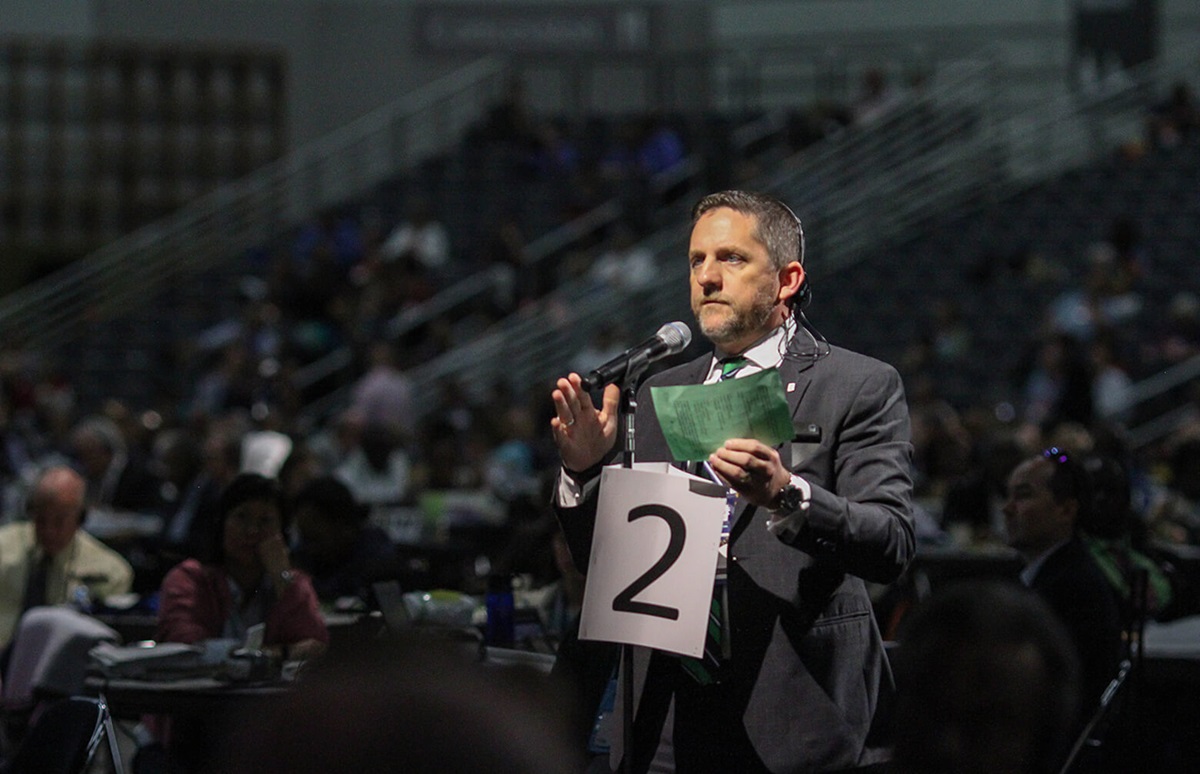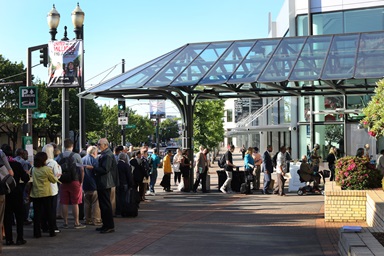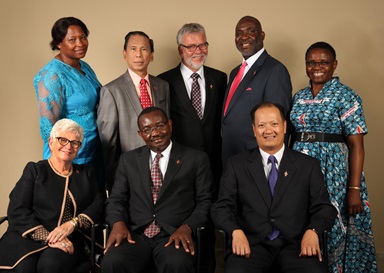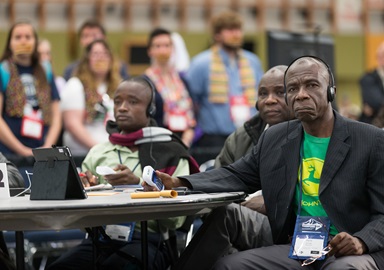When General Conference delegates get together, they often spend their time discussing votes and lobbying fellow delegates to vote as they do.
Lonnie Chafin, a lay delegate from the Northern Illinois Conference, wanted a different approach ahead of next year’s special session of The United Methodist Church’s top legislative assembly.
The 2019 special General Conference seeks to resolve the denomination’s longtime debate over ministry with LGBTQ individuals — a dispute that threatens to splinter the 12.5 million-member, multinational denomination.
With that in mind, Chafin helped bring together a multinational group of 55 delegates and 10 additional church leaders for a gathering aimed not at bolstering a particular perspective but at building relationships.
The group, which met July 13-15 at United Methodist-related Scarritt Bennett Center in Nashville, Tennessee, does not have a name.
The meeting wasn’t supported by any official church organization or any of the unofficial United Methodist advocacy groups that has staked a position on homosexuality. Church Properties Reimagined, a nonprofit organization focused on maximizing the ministry potential of Chicago-area church properties, provided financial support. Chafin added that no United Methodist apportionment dollars were used.
No press attended the meeting.
“We wanted delegates to talk about the plans without spin,” Chafin said. “To that end, we tried to get a theological spectrum in the room.”
Not invited, he said, were people “who are willing to break the church over their own position.” That guideline, he said, excluded people on the extremes.
Mainly, it was people who wanted to talk about how to keep the church together.
Chafin said the view articulated most during the meeting was a deep love for The United Methodist Church. “I watched people on all sides of the political spectrum get emotional and choke up when they talked about how much this church has meant to them,” he said.
The delegates scheduled the meeting after General Conference’s July 8 deadline for petition submissions, in expectation of having actual legislation to discuss.
The Council of Bishops initially announced plans to release a report with information on three different proposals by the bishop-appointed Commission on a Way Forward by July 8.
However, on July 9, bishops announced a delay in releasing the commission’s report because it still needed translation from English into the other three official General Conference languages — French, Kiswahili and Portuguese.
Even without legislation in hand, Chafin said, the group used publicly available information to discuss the three plans.
Those are:
- The Traditionalist Plan, which would increase enforcement of the denomination’s current prohibitions against same-gender weddings and “self-avowed practicing” gay clergy.
- The Connectional Conference Plan, which would restructure the denomination to have churches and conferences align into different connectional conferences based on theological outlook.
- The One Church Plan, which would leave questions of marriage and ordination closer to the local church and conference level.
A majority of bishops have recommended the One Church Plan, and Chafin said that proposal was a particular focus of the delegates in Nashville with many expressing support.
The Rev. Juan Huertas, a Louisiana Conference reserve delegate, was among those at the meeting who support the One Church Plan. While not perfect, he said, the plan is a step toward keeping The United Methodist Church united in mission and ministry for years to come.
“For me, our witness in such a polarized society is crucial,” said Huertas, lead pastor of 1,985-member Grace Community United Methodist Church in Shreveport, Louisiana.
“I often think if we cannot find a way to live together in difference, how can we ask people in the world to do the same? If we cannot be agents of reconciliation within our own body, our witness is damaged.”
Mathew Pinson, a lay delegate from the North Georgia Conference at the meeting, also expressed his hope that the 2019 General Conference adopts the One Church Plan.
"United Methodists are the last mainline Protestant denomination that maintains hospitals, schools, colleges, universities and program agencies like UMCOR," he said, referring to the United Methodist Committee on Relief. "UMCOR, for example, is a world leader in disaster response. In fact, UMCOR is the agency that the Red Cross relies on for first-level deployment of volunteers and shelters when natural disasters occur. In my view, it would be a grave sin to allow these important ministry efforts to collapse because the church could not find a way forward in the unity of Christ."
He also emphasized that Christians are already bound together through their baptismal covenant, which is more powerful than any polity, creed or biblical interpretation. "I am not going to sit on the sidelines of this conversation and watch people pull the church further apart — I am going to work for unity, peace and justice," he said.
The Rev. Mark Holland, a Great Plains Conference delegate, goes a step further. He is taking a year of sabbatical to promote the One Church proposal, launching a new group named Mainstream UMC with that purpose.
Holland described the Nashville gathering as an opportunity to do some deep thinking and engage in Christian conferencing among both those supportive and those skeptical of the plan. At General Conference 2016, Holland made the motion that eventually led to the bishops launching the Way Forward process.
The One Church Plan has plenty of critics on both the progressive and traditionalist sides of the denomination’s theological spectrum. While one advocacy group — Uniting Methodists — has endorsed the plan, others such as Good News and the Wesleyan Covenant Association have come out strongly against it.
Reconciling Ministries Network, which advocates for full equality of LGBTQ individuals in the life of the church, has not taken an official position at this point.
“The One Church Plan is not a progressive plan,” said Jan Lawrence, the group’s executive director, who attended the Nashville meeting. “The plan makes a step toward reducing the harm done in the church now. It stops well short of eliminating the harm.”
The Rev. David Livingston, another Great Plains Conference delegate at the meeting, echoed that sentiment.
“The One Church Plan really is a compromise,” he said. Livingston is the pastor of 763-member St. Paul’s United Methodist in Lenexa, Kansas.
Most participants at the Nashville meeting, he said, came away recognizing that delegates will not be able to pass the perfect plan in 2019. That recognition opens the way to finding common ground.
“In any relationship we sometimes have to choose to get less than our ideal result for the sake of the relationship,” he said. “That’s the Body of Christ, where the eye needs the ear and the ear needs the nose. We’re not going to get this exactly right in 2019, but I do believe we will choose to stay in relationship.”
The Rev. Kalaba Chali, a Zambian native who is now mercy and justice coordinator in the Great Plains Conference, came to the meeting with experience around the denomination’s global connection. He is not a delegate nor an advocate but instead attends General Conference as a French-English translator.
He described the meeting as “very Spirit-filled.”
“It wasn’t about competing for one side but about having dialogue,” he said.
His hope is that delegates from Africa, Asia and Europe, will be able to examine the legislation in their own languages before siding with any particular advocacy group.
He added that he has spoken with United Methodists in the Democratic Republic of Congo, Burundi and Mozambique who are interested in finding some compromise to help the church stay together.
Chafin said the Nashville meeting is not the beginning of a new group or movement. But he hopes it is the beginning of connections that will last through the 2019 General Conference in St. Louis.
“There’s no question, we’re all part of the same family reunion now.”
Hahn is a multimedia news reporter for United Methodist News Service. Contact her at (615) 742-5470 or newsdesk@umcom.org. To read more United Methodist news, subscribe to the free Daily or Weekly Digests.
Like what you're reading? Support the ministry of UM News! Your support ensures the latest denominational news, dynamic stories and informative articles will continue to connect our global community. Make a tax-deductible donation at ResourceUMC.org/GiveUMCom.




